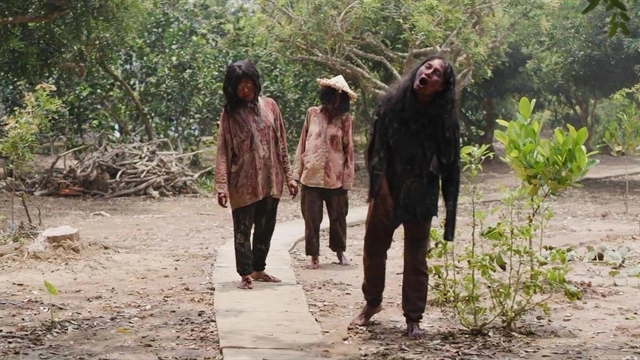
'Cù Lao Xác Sống' (Lost in the Mekong Delta) is the first Vietnamese zombie movie to hit theatres. Photo kenh14.vn
HÀ NỘI Việt Nam's first-ever zombie film, Cù Lao Xác Sống (Lost in the Mekong Delta) has taken over VNĐ11.5 billion (US$488,000) in the ten days since hitting the big screen.
According to Box Office Vietnam, a local box office data analysis site, the horror film by director Nguyễn Thành Nam was the second-most watched film during the four-day National Day holiday, behind Paws of Fury, which earned VNĐ15,6 billion ($661,000).
Lost in the Mekong Delta has numerous screening slots at major local cinema chains like CGV and Galaxy. Its revenue is ranked above many other international blockbusters, like Love Destiny the Movie (VNĐ4.6 billion) or Where the Crawdads Sing (VNĐ1.3 billion).
Its takings have also surpassed Vô Diện Sát Nhân (Faceless Killer), another Vietnamese horror film that premiered one week earlier and has taken VNĐ4.5 billion.
Its producer, Nhất Trung, said that many cinemagoers supported Việt Nam's first zombie film.
"Before launching the project, the production team perceived that the film would exploit a fairly new theme in Vietnamese cinema, so it would be highly challenging, especially as it was filmed during the complicated situation of the COVID-19 pandemic. Therefore, we consider it the first experimental step for improvement in the next projects," Trung told vnexpress.vn.
Lost in the Mekong Delta, rated 18+, is set on an island downstream of the Mekong River. The residents desperately try to flee from an epidemic that turns victims into bloodthirsty and aggressive zombies.
Protagonist Công, a doctor played by Huỳnh Đông, tries to save himself and his loved ones.
Not only showcasing the battles for survival between the zombies and humans but the horror flick is also expected to convey the message of humanity.
As the first Vietnamese zombie horror film, a theme that has been exploited successfully by many international blockbusters, Lost in the Mekong Delta attracted the curiosity of many even before its official screening.
The film had significant investment in the sound effects and visuals for the zombies. The many bloodthirsty creatures roaming the big screen could satisfy any horror enthusiast.
The cast includes renowned actors and actresses like Huỳnh Đông, Ốc Thanh Vân and Thanh Hằng. Their reputation guarantees the quality of the film.
Another success of Lost in the Mekong Delta is maintaining Vietnamese identity despite exploiting a foreign theme. Its backdrop features many typical images of the rural area in the delta region, like paddy fields, footbridges and brickyards.
Many scenes were elaborately staged to create the effect of anxiety. The director varied the camera angles to give viewers the terrifying moment when people face death.

Not only showcasing battles for survival between the zombies and humans, the horror flick also conveys a message of humanity. — Photo afamily.vn/
Despite being the first Vietnamese zombie movie to pass cultural censorship and hit theatres on the occasion of National Day, Lost in the Mekong Delta has not satisfied everyone.
The best point of the film – the zombies – has also received the most criticism.
"Compared to the zombies running like crazy in World War Z (2013) or being able to think in Army of the Dead (2021), the Vietnamese zombies are just silly and outdated," said Trần Thị Minh Nguyệt, a Vietnamese horror movie enthusiast.
Despite their scary appearances, the Vietnamese zombies move in slow motion and can hardly catch up with their human prey. Some are easily beaten dead with sticks or a handbag, which alleviates their creepiness and even creates humour.
The production crew has integrated their creativity, particularly the humourous elements, making the script of some scenes absurd. For example, zombies are inanimate species but still need to sleep at night. In one scene, the scriptwriter also turns a zombie into a jiangshi, a Chinese hopping vampire, which could be deceived when humans hold their breath.
The most concerning issue – the origin of the pandemic – is not clearly explained. The characters only know that it comes from somewhere upstream.
Perhaps most disappointing, the film does not solve all the problems that it has set. However, it finishes with an open ending and a hint about a second part.
Despite the criticism, some audiences think domestic experimental projects should be supported when they venture into a new topic.
"I will go to see it because I appreciate the producers' effort to exploit a fairly new theme in the temporary Vietnamese film industry. New things need to be supported to be more refined in the future," said Nguyễn Bích Diệp, a student in Hà Nội. VNS
OVietnam